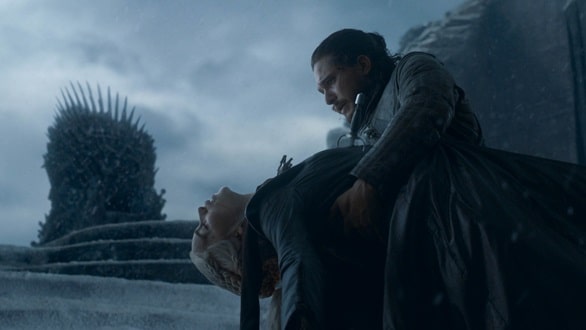The climactic conclusion of HBO’s Game of Thrones left audiences worldwide in shock as Jon Snow, the show’s steadfast hero, took the life of Daenerys Targaryen, his queen and lover. This pivotal moment has been the subject of extensive analysis and debate. To fully understand Jon’s decision, it’s essential to examine the events leading up to this act, the transformation of Daenerys’s character, and the moral dilemmas faced by Jon.
The Ascent and Descent of Daenerys Targaryen
Daenerys Targaryen’s journey from an exiled princess to the conqueror of King’s Landing is marked by both noble intentions and ruthless actions. Initially, she is portrayed as a liberator, freeing slaves in Essos and seeking to reclaim her family’s throne to establish a just rule. However, as she draws closer to her goal, her methods become increasingly severe. The turning point occurs during the Battle of King’s Landing, where, despite the city’s surrender, Daenerys orders the destruction of the city, resulting in the deaths of countless innocents. This act of mass violence signals her descent into tyranny, echoing the madness of her father, the Mad King Aerys II.

Jon Snow’s Moral Quandary
Jon Snow, known for his unwavering sense of honor and duty, finds himself in a profound moral crisis following Daenerys’s actions. His loyalty to her is tested as he witnesses the devastation she brings upon King’s Landing. Tyrion Lannister, once Daenerys’s Hand, confronts Jon, urging him to recognize the threat she poses to the realm. Tyrion warns that Daenerys’s belief in her own righteousness could lead to further atrocities, stating, “Everywhere she goes, evil men die, and we cheer her for it. And she grows more powerful and more sure that she is good and right.”
The Influence of Tyrion Lannister
Tyrion’s counsel plays a crucial role in Jon’s decision-making process. Imprisoned for treason after freeing his brother Jaime, Tyrion implores Jon to see the potential for future bloodshed under Daenerys’s rule. He appeals to Jon’s sense of duty to protect the people of Westeros, suggesting that only Jon has the proximity and trust to stop her. This conversation forces Jon to confront the possibility that his love for Daenerys may be blinding him to the greater good.
The Final Confrontation
In the throne room of the Red Keep, amidst the ruins of the city, Jon confronts Daenerys. He pleads with her to show mercy and to reconsider her vision of a world remade through fire and blood. Daenerys, unwavering in her conviction, believes her actions are justified and necessary to build a better world. Realizing that she cannot be swayed and that her future actions may lead to further destruction, Jon makes the harrowing decision to kill her, believing it to be the only way to prevent more innocent lives from being lost.
Parallels to Historical and Literary Themes
Jon’s act of killing Daenerys draws parallels to historical and literary themes of betrayal for the greater good. It echoes the assassination of Julius Caesar, where Brutus participates in the killing of his friend to prevent the rise of a dictator. Similarly, Jon’s decision reflects the complex nature of loyalty and the painful choices leaders must make when personal bonds conflict with moral imperatives.
Reception and Critique
The series finale received mixed reactions from fans and critics. Some praised the poetic justice and the tragic inevitability of Jon’s decision, while others felt the character development leading to this moment was rushed. Actor Emilia Clarke, who portrayed Daenerys, expressed her own struggles with her character’s arc, stating that she still “stands by” Daenerys and questioned whether Jon could have taken a different approach, such as discussing his concerns with her.
Conclusion
Jon Snow’s decision to kill Daenerys Targaryen is a culmination of complex character arcs, moral dilemmas, and thematic elements woven throughout Game of Thrones. It serves as a poignant reminder of the burdens of leadership and the sacrifices made in the pursuit of peace. While the act is fraught with personal anguish, it underscores the series’ exploration of power, morality, and the often-tragic consequences of noble intentions gone awry.



